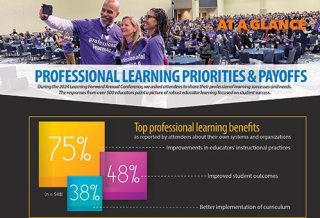FOCUS
Questions that Lead To Action
Safe and equitable classrooms for deep learning
By Luis R. Soria and Margery Ginsberg
Categories: Data, Reaching all studentsOctober 2016
Vol. 37 No. 5
Read the remaining content with membership access. Join or log in below to continue.
Sed ut perspiciatis unde omnis iste natus error sit voluptatem accusantium doloremque laudantium, totam rem aperiam, eaque ipsa quae ab illo inventore veritatis et quasi architecto beatae vitae dicta sunt explicabo. Nemo enim ipsam voluptatem quia voluptas sit aspernatur aut odit aut fugit, sed quia consequuntur magni dolores eos qui ratione voluptatem sequi nesciunt. Neque porro quisquam est, qui dolorem ipsum quia dolor sit amet, consectetur, adipisci velit, sed quia non numquam eius modi tempora incidunt ut labore et dolore magnam aliquam quaerat voluptatem.
References
Deci, E.L. & Ryan, R.M. (1991). A motivational approach to self: Integration in personality. In R. Dienstbier (ed.), Perspectives on motivation: Nebraska Symposium on Motivation, 1990. Lincoln, NE: University of Nebraska Press.
Elliot, A.J. & Dweck, C.S. (Eds.). (2013). Handbook of competence and motivation. New York, NY: The Guilford Press.
Ginsberg, M.B. (2011). Transformative professional learning: A system to enhance teacher and student motivation. Thousand Oaks, CA: Corwin Press.
Ginsberg, M.B. (2015). Excited to learn: Motivation and culturally responsive teaching. Thousand Oaks, CA: Corwin Press.
Ginsberg, M.B. & Wlodkowski, R.J. (2009). Diversity and motivation: Culturally responsive teaching in college. San Francisco, CA: Jossey-Bass.
Groenke, S.L. (2010). Seeing, inquiring, witnessing: Using the equity audit in practitioner inquiry to rethink inequity in public schools. English Education, 43(1), 83-96.
Skrla, L., Scheurich, J.J., Garcia, J., & Nolly, G. (2004). Equity audits: A practical leadership tool for developing equitable and excellent schools. Educational Administration Quarterly, 40(1),133-161.
Wlodkowski, R.J. (2008). Enhancing adult motivation to learn: A comprehensive guide for teaching all adults (3rd ed.). San Francisco, CA: Jossey-Bass.
Zeigler, K. & Camarota, S.A. (2015, August). Immigrant population hits record 42.1 million in second quarter of 2015. Available at https://cis.org/Immigrant-Population-Hits-Record-Second-Quarter-2015.
Categories: Data, Reaching all students
Recent Issues
LEARNING DESIGNS
February 2025
How we learn influences what we learn. This issue shares essential...
BUILDING BRIDGES
December 2024
Students benefit when educators bridge the continuum of professional...
CURRICULUM-BASED PROFESSIONAL LEARNING
October 2024
High-quality curriculum requires skilled educators to put it into...
LEARNING TO PIVOT
August 2024
Sometimes new information and situations call for major change. This issue...












